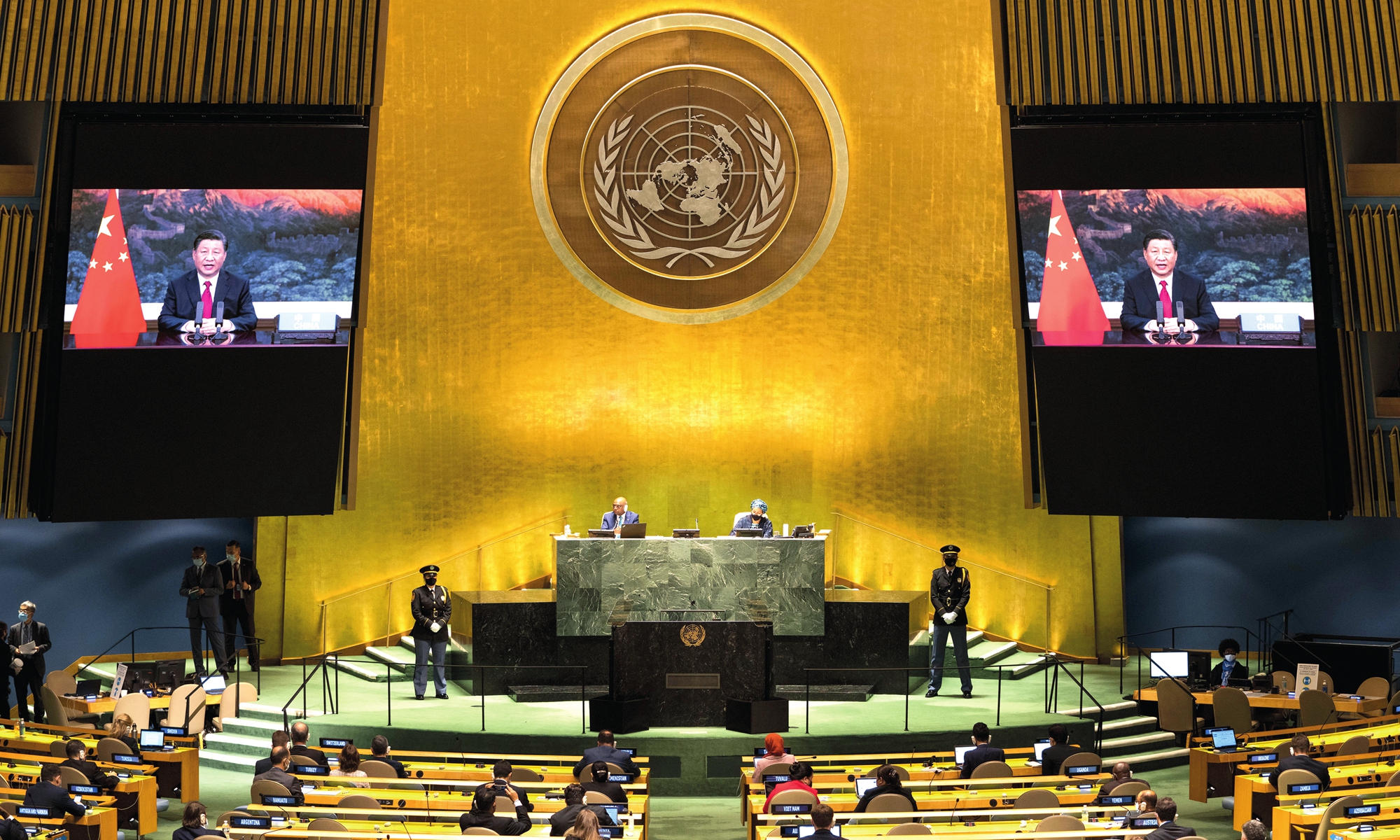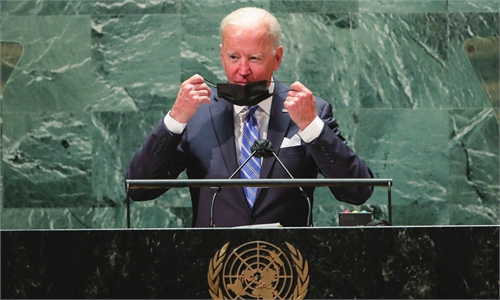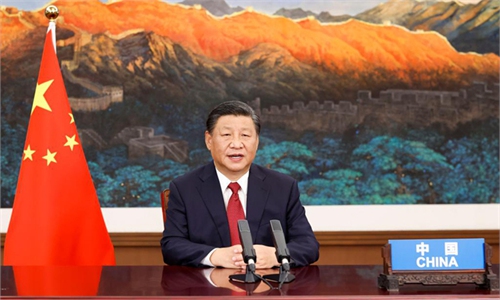Xi emphasizes inclusiveness, rejects zero-sum game at UN
Speech injects confidence, showing China eyes greater good: expert

Chinese President Xi Jinping on Tuesday addresses the general debate of the 76th session of the United Nations General Assembly via video, calling for jointly addressing global threats and challenges to build a better world for all. Photo: Xinhua
Chinese President Xi Jinping proposed a Global Development Initiative in his speech at the 76th general debate of the UN General Assembly (UNGA), injecting confidence and calling to jointly address global threats and challenges to build a better world for all.
In contrast, US President Joe Biden, who spoke before Xi at the same event on Tuesday, focused his remarks justifying US acts that have intensified the tensions worldwide and triggered concerns of a new cold war.
Xi made the remarks via video from Beijing on Tuesday New York time, as the world is facing the combined impacts of changes unseen in a century compounded by the COVID-19 pandemic. In his speech, Xi talked about the fight against the pandemic, economic recovery, international relations and global governance, and proposed a series of new initiatives and measures.
Zhang Jun, Permanent Representative of China to the UN, told media that after Xi's speech, many countries' representatives to the UN spoke highly of the speech, "as they consider the remarks… brought confidence and strength, and also showed China's courage and sense of responsibility as a responsible major power."
Observers said when the world is facing serious challenges and needs major powers to play a more responsible role, China is eyeing the greater good for humanity, multilateralism and responsibility, but the US is trying to whitewash problems and mistakes it made that harmed many countries worldwide, including its allies. It is attempting to force the world to accept its problematic and arrogant "leadership."
"The keynote of Xi's speech is moderate and calm in general. China has no intention to spark conflict with any country or alliance formed by multiple states, and China is not interested in having furious debates with any country on international order," said Li Haidong, a professor at the Institute of International Relations of China Foreign Affairs University.
China will never exploit the UN platform to accuse others or lecture them, and the message China sent is about positive, inclusive and farsighted initiatives that are able to respond to common challenges and concerns shared by the majority of the international community, Li said.
Comparing the speeches delivered by the two leaders from China and the US, we can find many differences between the two countries' political systems and cultures, said Wang Yiwei, director of the institute of international affairs at the Renmin University of China.
"China can make long-term, certain and verifiable promises to the world as its political system is stable and reliable, but when the US promises something, other countries will definitely question Washington's credibility, because the political system in the US will bring huge uncertainties," Wang noted.
"Some voices from the US might want to hype that China and the US had a war of words at the UN, but it was not the case. Comparing the words and deeds of China and the US, it's obvious who's safeguarding and who's undermining world peace and development," Li told the Global Times
Responsibility
The COVID-19 pandemic that is still raging globally must be addressed with global efforts. "We must beat COVID-19 and win this decisive fight crucial to the future of humanity," Xi said, voicing confidence that "we humanity will surely overcome it and prevail" despite the fact that the COVID-19 pandemic may appear overwhelming.
Biden also mentioned the pandemic in his speech, but somewhat awkwardly. He said "Indeed, today, many of our greatest concerns cannot be solved or even addressed through the force of arms. Bombs and bullets cannot defend against COVID-19 or its future variants."
"Who uses bombs and bullets to fight COVID-19? This strange thinking could only emerge in the mind of American elites like Biden," Lü Xiang, a research fellow and an expert on US studies at the Chinese Academy of Social Sciences, told the Global Times.
This shows that the Biden administration has no proper plan to handle the pandemic. Everyone knows the US has done the worst job of containing the pandemic, with the most deaths and infections in the world, "but still, Biden repeatedly says the US will lead the world to fight COVID-19. It's truly a joke," Lü noted.
Xi, in his speech, called to put people and lives first, take a science-based approach in origins tracing, enhance the coordinated global COVID-19 response and minimize the risk of cross-border virus transmission. Noting that vaccination is a powerful weapon against COVID-19, Xi said the pressing priority is to ensure fair and equitable distribution of vaccines globally.
Xi reiterated the pledge that China will strive to provide 2 billion doses of vaccines to the world by the end of this year. "In addition to donating $100 million to COVAX, China will donate 100 million doses of vaccines to other developing countries in the course of this year."
"We should care about the special needs of developing countries. We may employ such means as debt suspension and development aid to help developing countries, particularly vulnerable ones facing exceptional difficulties, with emphasis on addressing unbalanced and inadequate development among and within countries," Xi said.
Vulnerable nations must include countries like Afghanistan, Lü said, stressing the country has been occupied by the US for 20 years when it experienced serious internal chaos. The coming winter will be a challenge for Afghan people. The expert said China offers hope for this kind of vulnerable countries to find a new way when the West, especially the US, failed to help, instead leaving them in turmoil.
Xi's pledge on Tuesday that China will not build new coal-fired power projects abroad is seen by observers as a sign that Beijing is devoted to curbing global warming with the "firmest determination and greatest efforts," in order to achieve its green commitment on schedule and build a better future.
In contrast to Biden's hollow promises on climate change, COVID-19 and global unity, on which the US hasn't contributed much or, in some cases, even sabotaged progress, experts hailed Xi's remarks and said they show a devotion to solving humanity's most crucial issues.
Multilateralism
Biden, the president chanting the slogan "America is back," did not mention the word "multilateralism" in his speech while Xi mentioned it four times and stressed China's stance to uphold this core value of the UN. Biden apparently prefers the word "allies," mentioning it eight times, even as it just betrayed one of its core allies France with the AUKUS deal.
President Xi said "the year 2021 is a truly remarkable one for the Chinese people", as it marks the centenary of the Communist Party of China as well as the 50th anniversary of the restoration of the lawful seat of the People's Republic of China in the United Nations, a historic event that China will solemnly commemorate.
Xi said "we must improve global governance and practice true multilateralism. In the world, there is only one international system, i.e. the international system with the United Nations at its core. There is only one international order, i.e. the international order underpinned by international law. And there is only one set of rules, i.e. the basic norms governing international relations underpinned by the purposes and principles of the UN Charter."
Biden said in his speech the US will cooperate with multilateral institutions like the UN, but the word "multilateralism" in the White House vocabulary has a different definition compared to the Chinese one, said experts, as the international system that the US prefers is one with "the US at the core," but the one that China advocates is "with the UN at its core."
As long as the US keeps its exclusive alliances that target other countries, there will be no real multilateralism in US diplomacy and strategy, and even within the US-led alliances, the US will still harm and cheat its allies, Lü said.



